
Finding other families who share values, activities, and parenting philosophies can transform life in East Tennessee from pleasant to deeply fulfilling. Whether interest lies in outdoor adventures, faith-based community, homeschooling networks, or simply shared cultural pursuits, this region offers many pathways to meaningful connections. The following guide outlines practical approaches to building lasting relationships with like-minded families across the area.
East Tennessee spans vibrant cities, suburban neighborhoods, and rural valleys. Different communities have unique rhythms—university towns pulse with events and volunteer opportunities, while mountain areas attract families who value nature and a slower pace. Start by mapping out the kinds of neighborhoods and towns that align with a family’s lifestyle and priorities.

Local community centers, libraries, and parks departments typically maintain calendars filled with family-friendly events. Scanning municipal websites and bulletin boards helps identify recurring programs like family storytime, seasonal festivals, and fitness classes that attract similar families. These routine gatherings often become natural meeting points for introductions and friendships.
Neighborhood associations and homeowners’ associations frequently host block parties, garage sales, and seasonal gatherings. These events provide a low-pressure environment to meet families who live nearby and share local concerns and priorities. Participating in committees—such as safety, beautification, or event planning—accelerates familiarity and builds rapport over shared work.
Many associations also maintain private social media groups or newsletters which serve as additional platforms for communication and engagement. These channels can be invaluable for keeping up with local news, sharing resources, and staying informed about community developments. Engaging actively in these digital spaces often opens doors to casual meetups, playdates, and collaborative neighborhood initiatives.
Churches, temples, and cultural centers are central hubs for many families, offering youth programs, service projects, and study groups. These organizations often emphasize shared values and provide structured opportunities for families to connect, such as volunteer missions, holiday celebrations, and potlucks. Exploring faith-based schooling or community outreach programs can also reveal families with similar beliefs and commitments.
Beyond spiritual gatherings, many cultural organizations host arts workshops, language classes, and traditional festivals that celebrate heritage and foster inclusivity. These events present organic environments for families to engage with one another through shared culture and heritage. Being part of such groups not only enriches social life but also supports the preservation of community traditions and the nurturing of intergenerational relationships.
Homeschooling communities in East Tennessee are robust and varied, ranging from informal co-ops to organized pods and enrichment classes. These groups bring together families who prioritize custom educational approaches, creating frequent interaction through classes, field trips, and extracurriculars.

Local homeschooling networks often maintain social media groups and email lists where parents share resources, organize meetups, and plan group learning experiences. Visiting a few co-op sessions or joining a one-off field trip is a good way to see if the pedagogical approach and family dynamics fit.
Micro-schools and pods provide hybrid models that blend small-group instruction with parent involvement. These arrangements attract families looking for community-driven education that still allows for flexible schedules and personalized learning. Families can form pods around subjects like science, arts, or language learning, rotating hosting responsibilities to spread logistics and costs.
Museums, nature centers, and universities in East Tennessee offer workshops tailored to children and families. From weekend art studios to hands-on science labs, these programs gather families who value experiential learning. Signing up for a series of classes increases the chance of regular interactions and friendship formation.
The region’s abundant natural beauty—from the Smoky Mountains to winding rivers—makes outdoor recreation a major connector for families. Hiking groups, paddling clubs, and youth outdoor programs attract families who prioritize nature, physical activity, and adventure-based learning.
Parks and recreation departments often organize family-friendly hikes, bird-watching walks, and conservation projects. Volunteering for trail clean-ups or habitat restoration provides shared purpose, fosters teamwork, and builds connections rooted in stewardship of local landscapes.
Designated family trails and guided interpretive hikes cater to mixed-age groups, with shorter distances and educational elements. These outings typically draw families who enjoy exploring the outdoors together and are eager to trade trail tips, gear recommendations, and local knowledge.
Community sports leagues and outdoor clubs—such as climbing groups or river-runners—bring parents and children together through practices, competitions, and weekend excursions. Consistent attendance fosters social bonds among families whose schedules and interests align.
Beyond education and recreation, shared hobbies can be powerful connectors. Families who cook together, garden, play music, or craft often seek others with similar passions to share supplies, skills, and space. Local hobby shops, community gardens, and arts centers can serve as meeting points.
Joining or starting a parents’ book club, a family choir, or a community garden plot opens opportunities for multi-generational relationships. These groups can also double as resource exchanges—sharing seeds, sheet music, or home-school curriculum components—strengthening the sense of mutual support.
Maker spaces and community art studios offer classes for families and children, from woodworking and pottery to digital fabrication. These environments encourage collaborative projects and mentorship between families, which often blossoms into friendships outside scheduled sessions.
Farmers’ markets, community-supported agriculture (CSA) programs, and farm-to-table events gather families who value local food and sustainable practices. Participating in a CSA share or organizing a market-day potluck fosters relationships built on shared culinary interests and local stewardship.
Online platforms make it easier to find families with similar values and schedules, but the goal should be to move from digital introductions to real-world meetups. Local Facebook groups, neighborhood apps, and parent forums are useful for discovering events and gauging community fit.

Social media groups dedicated to specific towns or interests often include event listings, school reviews, and open invitations for playdates. Use direct messaging to arrange initial meetups at public, family-friendly locations like parks or libraries to ensure comfort and safety for all parties involved.
Neighborhood apps that verify residents can provide a safer space to ask questions, list events, and seek recommendations. These platforms often have sections for families, schools, and activities, making it easier to find peers nearby who share a schedule or interest.
When connecting online, prioritize public first meetings and ask for references when appropriate—especially for recurring childcare exchanges or shared housing arrangements. Trust instincts and establish clear boundaries about supervision and expectations before committing to repeated interactions.
Lasting friendships form when families consistently share time, values, and responsibilities. Regular routines—weekly park meetups, monthly potlucks, or rotating playdates—help relationships evolve beyond occasional acquaintanceship. Commitments that require collaboration, like co-managing a playgroup or organizing a community event, deepen trust and reciprocity.
Communication plays a central role. Clear expectations about parenting differences, scheduling, and resource sharing prevent misunderstandings. Establishing simple rituals—such as a shared calendar, group chat, or a “library swap” box—keeps interactions organized and stress-free.
Hosting small, casual gatherings lowers the threshold for social connection. Backyard barbecues, themed potlucks, or craft afternoons invite participation without imposing heavy expectations. Rotate hosting duties among families to distribute effort and build ownership across the group.
Encouraging interactions between children, parents, and older adults strengthens the social fabric. Invite grandparents or neighbors to storytelling evenings, gardening workdays, or skills exchanges. These intergenerational activities enrich children’s experiences and introduce varied perspectives that deepen communal ties.
Moving to a new area, differing schedules, or language and cultural differences can make forming connections challenging. Intentional strategies reduce friction: attend events that coincide with free time, join groups that celebrate cultural diversity, and seek out mentoring programs that welcome new residents.
Transportation can be a barrier in more rural parts of East Tennessee. Carpooling lists, shared calendars, and rotating pick-up schedules make it easier for families to participate in groups that might otherwise feel inaccessible. Offering or requesting rides can be framed as part of community reciprocity.
Busy family lives benefit from small, manageable commitments. Opt for biweekly meetups instead of weekly ones if schedules are tight, and set realistic expectations about attendance and participation. Authenticity and consistency, even in small doses, often lead to stronger bonds than overstretched, inconsistent efforts.
Like-minded does not mean identical. Families who connect successfully often share core values while respecting differences in parenting styles, cultural practices, or household logistics. Prioritizing empathy and curiosity over judgment invites a broader, more resilient community.
Begin by listing three priorities—education style, outdoor activity level, and cultural or faith preferences—and search for groups aligned with those priorities. Attend one public event, introduce oneself to two families, and follow up with a suggestion for a simple next step, like meeting at a park or attending a local festival together.
Keep a small notebook or digital note of contacts, interests, and follow-up ideas. Over time, these small investments yield a network that supports childcare swaps, shared celebrations, and enduring friendships that enhance family life in East Tennessee.
Check local library calendars, parks and recreation schedules, university outreach programs, and farmers’ market postings for upcoming events. Social media groups focused on towns and parenting in East Tennessee also provide event listings and introductions to local families.
Connections with like-minded families take time and gentle persistence. By starting with common interests, showing up consistently, and cultivating hospitality and respect, a rich social life is achievable across East Tennessee’s communities. Those relationships often become the most meaningful part of life in the region—places to learn, celebrate, and grow together.
For families seeking a like-minded community in East Tennessee, Tennessee National offers a unique blend of luxury living and vibrant social connections. Nestled among scenic landscapes with top-tier amenities—such as a Greg Norman Signature Golf Course, private marina, and exclusive member events—our gated community provides the perfect setting to build lasting relationships and create unforgettable memories. Whether you prefer a move-in ready home or a custom build, explore a lifestyle tailored to your family’s values and interests. Schedule a private tour today and take the first step toward joining a welcoming community designed for connection and comfort.